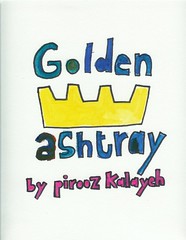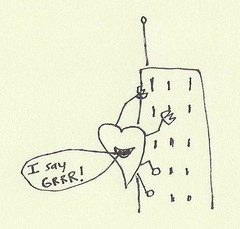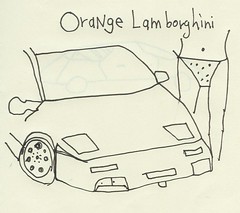
Is writing good if it is complicated? What is complicated?
If I showed you how to break a line to create enjambment between two juxtaposed images have I created the proper amount of complexity to garner a nod in respect. Is this what makes a poem good?
"Wow," someone might say. "That was smart."
What if I had an element of counterpoint that balanced the sonic scale of a line? Is this another element of complexity befitting a mad dash to the checkbox of "buck wild awesome"?
"Yes," one poet might say. "Bring it!"
"Forget that," another says. "You got to have a concept as a starting point."
"Oh," I say. "You mean like if I was thinking about how when you say tree, I have a different tree in my mind."
"Oh, yes," the poet says. "Saussure!!"
"And then I could create simulacrum with quantum mechanics as my theme. "Words as Quarks" would be the concept from which the poem is derived. I could even allow each Quark to be representative of human thought, as they collide against the language of photosynthesis, thereby remarking how the global factors of thought in current financial paradigms are the wrongdoings that cripple the environment like an electric thunder storm fueled my research with hundred dollar bills laid upon one another, until a stack higher than the World Trade Towers fell down upon a Redwood with the canon of poetry beneath it to make a large resounding crunch like an atom split open."
"Oh yes," that poet says. "You should write more like that."
It fascinates me that writers have any sense of what is good before they would read it, but there are some who carry a set of cards that dictate what they believe are the elements of good poetry.
A student may write with a beginner's conception of poetry, and actually collide into the preconceived parameters an instructor may uphold as the elements of a good poem to such a degree, that they are praised for their creation, and thereby given more of an impetus to proceed in a similar manner into the next writing exercise they participate. At the same time, this method of instruction does not allow for a discovery beyond the instructor's parameters. If this were the case, then every student who proceeded in this fashion would feel free from writing with the instructor as audience, and compose with a complete sense of autonomy.
Of course, that is if autonomy is the desired end-product. It may just be that the instruction of creative writing is crippled by the end-products that one would hope to gain from writing itself.
If a student enters a workshop, hoping for publication, awards, and a coveted position in academia, they will have already missed the opportunity to actually engage themselves in the writing that would hold weight beyond any classroom, periodical, or canon. This is not the writing of poetry or prose, as it has now become known in the money making enterprise of the majority of creative writing programs throughout the world. This is the writing of integrity. This is the writing of autonomy. This is the writing without any preconceived notions for what may or may not be considered good by the canon, publications, or colleagues.
To find this space, a student must be encouraged to explore the scope of what poetry has been, while the instructor drops their concepts of good and bad to provide an open reading for the journey the student has embarked.
That is why the language of approval must be dropped. Words such as "nice", "excellent", and "good" will only prolong a student's reliance on others. It would actually be more effective for an instructor to ask questions, and reflect upon the student as their instructor, for a true teaching to be exchanged. In this way, the student will form a self-reliance upon their work and collect tools from the writing presented and dissected within the classroom.
Isn't this interesting?
I wonder how many of you have tried to work with other creators only to find that there was no way in hell that you could cooperate on making the project come together.
"They are too obtuse," some might say. "They want it their way!"
The example we have seen at how instruction can hold integrity, is the same space by which an actual collaboration can be produced. If we believe that our co-teachers, partners, or significant others, are, in fact, less than ourselves in some way, then this will filter our actual integration and appreciation for what they may offer in the forms of creation.
Just imagine. I meet an artist who wants to create a joint poem for their upcoming journal. They ask me to do a round robin writing exercise to see what can be elicited. Each of us proceeds to write lines, and slowly, I notice that our language is opposing itself, because neither of us is actually reading the other's work. We are creating from and for our own parameters, and therefore have not actually entered a space of collaboration. We might as well be writing by ourselves.
This is the nature of most collaborations. Most who offer such an enterprise do not actually want to collaborate, but our in need of some sense of approval or goading to continue on the works they have already started. That is why I am cautious about entering a collaboration process, when there is an end result in mind.
If one enters a collaboration without a sense of one-upmanship, and can also maintain a sense of the unknown for what will be produced, then chances are that it will be a very fruitful experience.
In my artistic career, I have worked in collaboration with many individuals. The times when it has been the most effective is when I was able to drop my conception for right and wrong in the process, and allow for the individual whom I was working with to generate as much as I. In fact, I did not ever see myself as the creator in these situations. It was much more like a call and response.
I remember one songwriting workshop in Los Angeles. Although I could have penned an entire song by myself, I enjoyed the process of seeing what was brought to the table by my partner. I would simply listen, and try to respond without a sense of what would be right or wrong, but actually what I felt in my body as a response to what she was doing. Slowly, the song built itself without much effort at all.
Afterwards, I was quite surprised, and suddenly began to think of the countless situations where I had tried to collaborate with others, only to find some kind of obstruction in my path.
"Wow," I thought. "No thinking."
It was only listening and doing that were necessary. There was no "that sounds like this other riff" or "I need to make it more complicated" in my mind. I was simply allowing for what would be.
Recently, someone asked me how it was possible to reach a moment of equilibrium within their emotional world. I mentioned a series of practices one could embark on, but I could have responded with my experience in Los Angeles just as easily - listen and do. I don't believe it is anymore complicated than this.
Whether we are trying to learn how to be better instructors, collaborators, or grounded individuals, our only requirement is to listen to each moment, and then act upon it. This can become difficult if one gets wrapped into the concepts of others, or tries to resolve the issue within the mind alone; but if one is willing to just be in the moment, an ability to act without judgment or fear will be immediately present, because it is exactly what you are before you thought you were or had to be anything else.












No comments:
Post a Comment